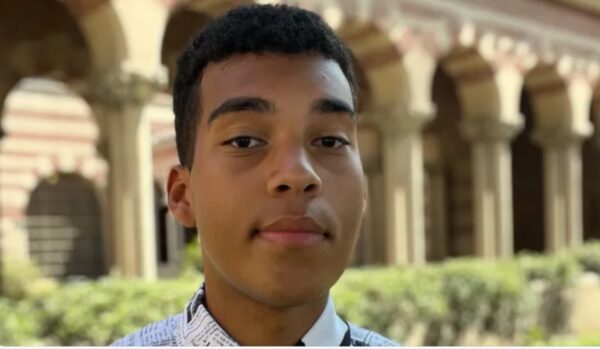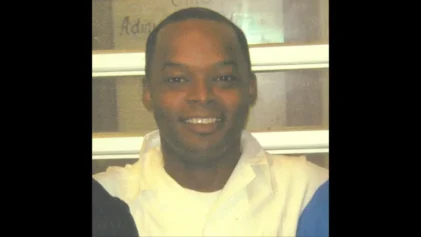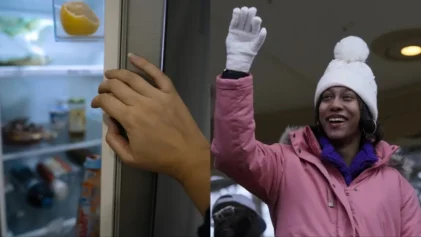A University of Southern California student is trying to put his life together after wrongly being swept up in a police dragnet last year.
The Nevada teenager’s advocates claim both the justice system and his own university treated him as a criminal after he was arrested on armed robbery charges while walking home through an area where cops were searching for violent suspects. He was incarcerated for weeks, but his troubles were not over when he got back to school.
In addition to the substantial time spent in jail, causing one professor to fear the student “might have broken some of those natural qualities that he had,” the university seemingly turned its back on the young man — not supporting him during this time and kicking him out of his dormitory.

Judah Adkins, described as a “soft-natured” individual in an Annenberg Media feature about his ordeal, is Black and Hispanic raised by his single father in Las Vegas. The young man was homeschooled growing up and dreamed of studying film and media one day in college. Through hard work and sacrifice by his father, who himself struggled to make ends meet, he was accepted into one of America’s top universities, USC, which ranks No. 28 on the 2024 US News World Reports’ Best Colleges list.
Trending Today:
- Come Get It’: Vulgar Door Dash Driver Delivers Order Then Spews Racial Slur, Viral Doorbell Camera Footage Shows
- Neighbor Kills New York Man and Stepson Execution-Style In Dispute Over Loud Music Captured on Video
- Long Island Man Points Gun at 6-Year-Old Who Mistakenly Placed a Halloween Candy Bag on His Porch, Faces Charges
His triumphant story of Black excellence unraveled during his freshman year’s second semester when the Los Angeles Police Department wrongfully arrested him.
On April 29, 2022, around 9:30 p.m., a couple was robbed at gunpoint by a group of young males. At the time of this incident, Adkins was attending a performance called the “SC Choreographic Showcase” at Bing Theatre near the center of USC’s campus. Annenberg Media describes how the next few hours would set Adkins on a path that led to his life-changing encounter with the criminal justice system:
Adkins’ actions from that night were self-reported in a “False Arrest Victim Complaint Letter,” which was sent to Charles Zukowski, USC’s provost at the time.
According to this written timeline of events, after parting from the group he had attended the showcase with, Adkins met with friend Aivy Levan, a then-freshman majoring in biological sciences, and others at Birnkrant Residential College on the east side of campus at around 10 p.m. The group took a Lyft to a party at 3414 Catalina Street, arriving at roughly 11 p.m.
As written in Adkins’ statement, he left the party sometime after 1 a.m., and screenshots from the student’s phone log reviewed by Annenberg Media show a series of frantic calls and text messages to friends — including Levan — and family. A little after this time, Adkins explained that he noticed the growing sound of sirens and a helicopter.
Officers eventually arrived at Adkins’ location on Catalina Street, a couple streets over from where the suspects’ vehicle was found. “I tried explaining that I was a USC student simply walking home, but I had no human response from any of these officers,” Adkins said.
Adkins was arrested at 1:50 a.m. on the morning of April 30 by three LAPD officers, triggering an over two-month ordeal that ruined his experience as a first-year college student.
Adkins was charged with armed robbery with a deadly weapon. He spent two weeks in Los Angeles Men’s County Jail, enduring harsh living conditions, sometimes up to 18 hours of cell confinement, and suffering from severe psychological distress.
In both county and Wayside jails, the freshman says he endured degrading treatment, likening it to being “treated like a dog.” He said his phone calls and shoes were withheld for four days, and meals were oftentimes inedible.
His bail was set to $150,000, a fee too steep for his parents to pay and get their son out.
According to a GoFundMe campaign launched by the friend who wrote the Annenberg Media feature, his mother had to take out a loan to cover his court costs, travel, and all the expenses related to his survival from the end of April until the end of June, including mental health services.
Even after being released from jail, he was required to wear a court-ordered tracking device. The ankle monitor interfered with not just classes but any internship the first-generation college student might have secured. It also stopped him from working.
“I hear[d] the story against me,” Adkins told Annenberg Media. “And then it definitely got to the point where I was like, yeah, it’s over. Everything that I worked for that I’ve done … my life is over.”
Additionally, USC suspended him.
The school administration escorted him out of his dorm in front of his peers and the university community, even though he was released from jail and had evidence that showed he was not guilty.
It would not be until June 2022, after the semester was over, that the suspension was lifted. That same month, prosecutors dropped the charges against him after investigators searched Adkins’ cellphone data, such as the Life360 app on his phone, which tracks one’s activities throughout the day, and decided he had nothing to do with the robbery or the three minors who also were arrested in connection with it,
He was able to return to school in the fall of 2022. They also continued to charge him for the semester when he was locked up.
The crowdfunding campaign, which was set up to help alleviate the financial burden caused by the ordeal of getting locked up and kicked out of school, says the “most compensation” that USC offered Adkins for the exhaustive two months of this experience was to give him “all A’s for the semester.”
Now that he is welcomed back on campus, Adkins also alleges only one faculty member — Assistant Vice Provost of Student Affairs Daren Mook — worked with Adkins to reintegrate into life on campus.
However, the student believed it was too little too late.
Not everyone from the school turned their back on him. Oliver Mayer, the director of dramatic writing at the School of Cinematic Arts and Adkins’ 2022 spring semester playwriting professor, expressed concern about his well-being.
“The thing that scared me the most about his time incarcerated is that … it might have broken some of those natural qualities that he had,” he told Annenberg Media.


